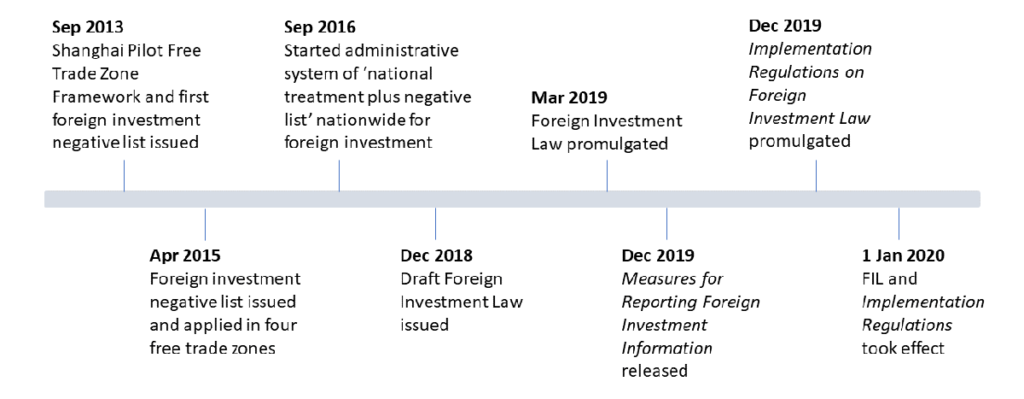
Advocacy successes of the European Chamber’s working groups
As the independent voice of European business in China since 2000, the European Chamber actively participates in China’s legislative process. Our advocacy activities are widely recognised by the Chinese authorities and maintained through the efforts of our working groups (WGs) and desks.
In 2019, we launched our #becauseofus campaign to show our gratitude for the joint efforts by all stakeholders: governments, think tanks, member companies and our own WG and desk managers. Over the remaining editions of EURObiz in 2020, we will present five examples of our successful advocacy work, one of which will be selected as the winner of the 2020 #becauseofus campaign.
For this edition, we look at the Chamber’s advocacy campaign focusing on the new Foreign Investment Law and related implementation guidelines.
Work achievements of the European Chamber
Since 2013, when the Framework Plan for China (Shanghai) Pilot Free Trade Zone was approved at a State Council Executive meeting—in which the ‘National Treatment plus Negative List’ administrative system for foreign investment was piloted for the first time—the European Chamber has attached great importance and actively participated in the reform of foreign investment administration. Thanks to the joint efforts of relevant government departments, the European Chamber and many of its member companies have witnessed a series of amendments to the legal framework related to foreign investment over the past seven years. This article presents a selection of results of the Chamber’s advocacy efforts reflected in the Foreign Investment Law (FIL) promulgated in 2019.
1. Consultations on drafts
The European Chamber actively participated in public consultations on and discussions of the FIL initiated by the Ministry of Commerce (MOFCOM), the Ministry of Justice (MOJ), the Shanghai Municipal Commission of Commerce, and other central and local government departments. More than 20 of the European Chamber’s WGs (out of a total of 33 WGs and desks) were involved in the discussion, collection, coordination and submission of comments and opinions representing the voice of foreign-invested enterprises (FIEs) operating in China across multiple industries, such as automotive, energy, pharmaceutical, chemical, financial services and legal consultation. We were delighted to see that our concerted efforts brought actual changes to the proposed FIL and its Implementation Regulations: compared to their draft texts, wider access to participation in standards setting is provided for, details on the government’s legal liabilities are clearer and the policy and procedures are more transparent.
2. Seminars and Conferences
While the FIL and its Implementation Regulations were still under drafting, European Chamber representatives participated in many thematic seminars and conferences held by relevant associations and institutions, including:
- a seminar on the draft FIL held by the Legislative Affairs Committee of the National People’s Congress (NPCLAC) on 9th January 2019;
- a seminar on the draft Implementation Regulations of the FIL held by the China Council for the Promotion of International Trade on 20th November 2019;
- a private session on regulations for the implementation of the FIL at the Qingdao Summit of the Top 500 Multinational Corporation Leaders in 2019; and
- a FIL roundtable meeting held by the China Centre for International Economic Exchanges .
The European Chamber considered participating in these conferences as opportunities to gain perspectives from different industries, as well as to voice opinions and feedback on behalf of our member companies.
Since the FIL and Implementation Regulations were promulgated, the European Chamber held a number of seminars and events to facilitate discussion and interpretation of the legislation, such as a seminar on the Measures for the Reporting of Foreign Investment Information (Draft for Comments), and policy interpretation on the Implementation Regulations of the FIL.
3. Post-promulgation efforts
In the post-FIL era, the European Chamber has also been paying close attention to any updates and adjustments to relevant laws and regulations, and providing opinions regarding the Measures for the Reporting of Foreign Investment Information, issued by the MOFCOM.
The European Chamber has established a direct and stable communication mechanism with central government departments, such as MOFCOM and the NPCLAC, in order to discuss FIL-pertinent issues and affairs.

European Chamber’s stance on the FIL
“The Chamber fundamentally disagrees that a legal distinction should be maintained between foreign and local companies, unless it is to provide exceptions for legitimate reasons such as specific national security concerns. Furthermore, the Chamber notes the use of broad terms and vague language throughout the FIL and its Implementation Regulations, as many of its articles read more like policy commitments than binding legal clauses, which leaves room for discretionary implementation.
“Nevertheless, the European Chamber appreciates the aim of streamlining existing legislation by unifying into a single law the three previous legal foundations that governed foreign investment. It also recognises the attempt of the FIL and its Implementation Regulations to address some of the biggest challenges faced by foreign businesses, such as unfair technology transfers, intellectual property rights protection and equal opportunities in public procurement. The Chamber expects to see relevant laws and regulations updated according to the FIL and its Implementation Regulations in a transparent and timely manner.”


Recent Comments